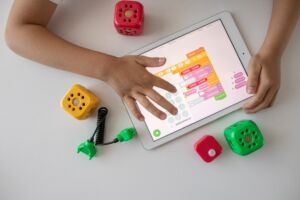News
The digital conundrum facing Danish education
This article is more than 2 years old.
As society becomes increasingly digitalised, the screen time usage among young children is skyrocketing at an alarming rate

Globally, the average screen time for children (ages 2-4) is 2 hours 30 minutes per day (photo: Unsplash)
Screen time among young children has become a contentious topic in Denmark, with phones, computers and tablets at the centre of the debate.
The education minister, Mattias Tesfaye, has taken a proactive stance and asked Styrelsen for Uddannelse og Kvalitet, Stuk, the agency for education and quality, to craft a set of guidelines on screen usage in schools.
In a letter to the country’s public schools, Tesfaye wrote: ”Children’s screen use has been rising rapidly in recent years and more and more research is suggesting that it is not healthy,” according to Politiken.
The guidelines could be developed for each stage of the educational system, contends Tesfaye, effectively adapting to the age-specific needs of the users.
Screen time in education: risks and challenges
Screen time poses inherent risks, even when employed in the educational system in digital-based lessons.
“Digital-based lessons can be well-justified as a didactic learning element, but screens can also reduce intimacy, distract and in some contexts pacify children and young people and make them less capable of performing individual tasks,” informed Tesfaye.
Rasmus Lund-Nielsen, the spokesperson for children and education with the Moderateren party, also opposes phones in the classroom.
Speaking on Radio4 Morgen, a DR radio programme, he said: “Telephones are simply something that is disruptive because we are used to using them for entertainment, gaming and social media. A lot of things that have nothing to do with what we do at school.”
Phones and children: a growing debate
Mobile phones have become ingrained in our daily routines, but the question remains: should they be introduced to children at such a young age?
While a political ban on phones would alleviate the burden of enforcing device policies on teachers, representatives from school associations have expressed scepticism regarding the possibility of completely eliminating phones from classrooms.
In his letter to the country’s public schools, Tesfaye said “the government will not introduce a ban, but that the school management needs to take responsibility of their screen usage”.
Recommendations from the agency are expected in October for youth education programs and in December for schools.










































